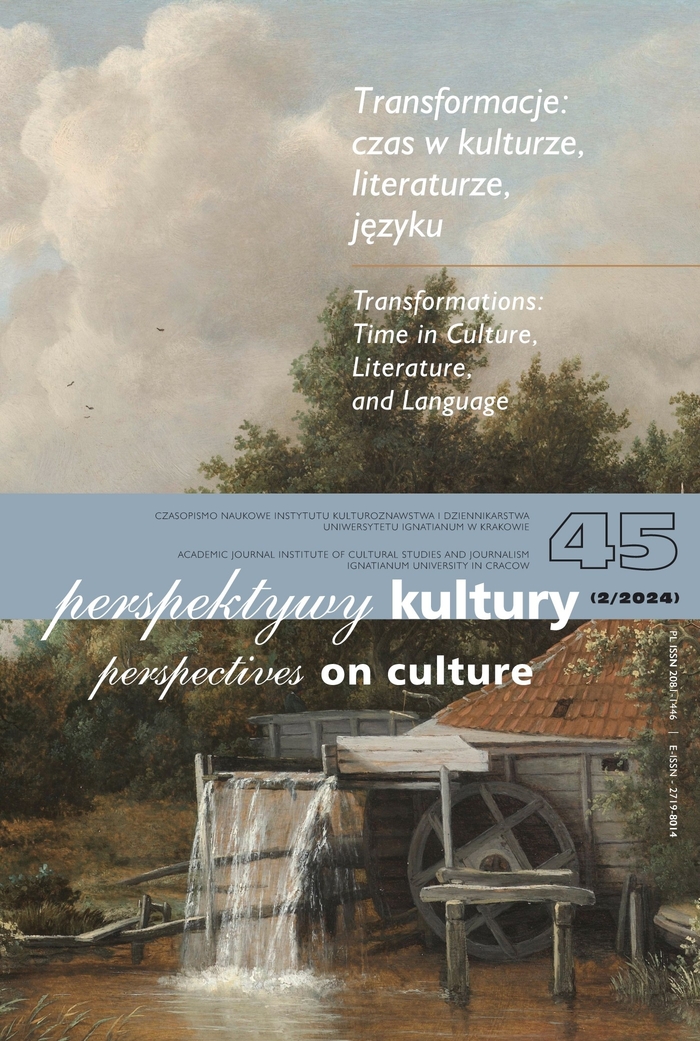Poor Future
Foreign Temporalities in Tadeusz Kantor’s Theatre of Death
Abstract
This article discusses Tadeusz Kantor’s theory and theatre in reference to a convoluted figure of the future. It reconstructs the principles of Kantor’s unorthodox vitalism permeating the theatre of death, rooted in affirmation of theatrical encounter. As it turns out, Kantor’s “impoverished” style might also be read as a blueprint for thinking the eponymous “poor future”: a figure of the future that escapes hopes and expectations, and functions as a trope of uncanny difference. Within the renegotiated boundaries of life and death, such a difference allows us to rethink our coexistence with alien, often unreconcilable, temporalities. The text is concluded with a tentative reading of Today Is My Birthday, Kantor’s final work, which integrates all domains of “poor future” discussed in the article.
References
Arvanitakis, K.I. (2019). A Psychoanalytic Perspective on Tragedy, Theater and Death. Tadeusz Kantor and the Ontology of the Self. London, New York: Routledge.
Badiou, A. (2001). Ethics. An Essay on the Understanding of Evil. Trans. P. Hallward. London, New York: Verso.
Badiou, A. (2013). Rhapsody for the Theatre. Ed. and trans. B. Bosteels with the assistance of M. Puchner. London, New York: Verso.
Braidotti, R. (2013). The Posthuman. Cambridge, Malden: Polity Press.
Bennett, J. (2010). Vibrant Matter: A Political Ecology of Things. Durham, London: Duke University Press.
Caputo, J.D. (1997). The Prayers and Tears of Jacques Derrida. Religion without Religion. Bloomington, Indianapolis: Indiana University Press.
Derrida, J. (1993). Aporias. Trans. T. Dutoit. Stanford: Stanford University Press.
Fazan, K. (2019). Kantor. Nie/obecność. Kraków: Wydawnictwo Uniwersytetu Jagiellońskiego.
Kantor, T. (1984). Wielopole, Wielopole. In: T. Kantor, Wielopole, Wielopole. Kraków, Wrocław: Wydawnictwo Literackie, 25–106.
Kantor, T. (1993a). “Reality of the Lowest Rank.” In: T. Kantor, A Journey through Other Spaces. Essays and Manifestos, 1944–1990. Ed. and trans. M. Kobialka. Berkeley, Los Angeles, London: University of California Press, 117–124.
Kantor, T. (1993b). “The Infamous Transition from the World of the Dead into the World of the Living: Fiction and Reality.” In: T. Kantor, A Journey through Other Spaces. Essays and Manifestos, 1944–1990. Ed. and trans. M. Kobialka. Berkeley, Los Angeles, London: University of California Press, 161–165.
Kantor, T. (1993c). “The Real ‘I’.” In: T. Kantor, A Journey through Other Spaces. Essays and Manifestos, 1944–1990. Ed. and trans. M. Kobialka. Berkeley, Los Angeles, London: University of California Press, 161–165.
Kantor, T. (1993d). “The Theatre of Death.” In: T. Kantor, A Journey through Other Spaces. Essays and Manifestos, 1944–1990. Ed. and trans. M. Kobialka. Berkeley, Los Angeles, London: University of California Press, 106–116.
Kantor, T. (1993e). “To Save from Oblivion.” In: T. Kantor, A Journey through Other Spaces. Essays and Manifestos, 1944–1990. Ed. and trans. M. Kobialka. Berkeley, Los Angeles, London: University of California Press, 166–171.
Kantor, T. (2004). Pisma. Dalej już nic... Teksty z lat 1985–1990. Ed. K. Pleśniarowicz. Wrocław, Kraków: Zakład Narodowy im. Ossolińskich – Wydawnictwo, Ośrodek Dokumentacji Sztuki Tadeusza Kantora CRICOTEKA.
Kantor, T. (2004). Pisma. Teatr śmierci. Teksty z lat 1975–1984. Ed. K. Pleśniarowicz. Wrocław, Kraków: Zakład Narodowy im. Ossolińskich – Wydawnictwo, Ośrodek Dokumentacji Sztuki Tadeusza Kantora CRICOTEKA.
Kantor, T. (2006). Wielopole, Wielopole Tadeusza Kantora. Zapis filmowy: Andrzej Sapija. Ośrodek Dokumentacji Sztuki Tadeusza Kantora CRICOTEKA. Film.
Kantor, T. (2008a). Dziś są moje urodziny. Zapis filmowy Stanisława Zajączkowskiego. Ośrodek Dokumentacji Sztuki Tadeusza Kantora CRICOTEKA. Film.
Kantor, T. (2008b). Nigdy tu już nie powrócę. Zapis filmowy Andrzeja Sapiji. Ośrodek Dokumentacji Sztuki Tadeusza Kantora CRICOTEKA. Film.
Kantor, T. (2009). “Illusion and Repetition.” In: M. Kobialka, Further on, Nothing. Tadeusz Kantor’s Theatre. Minneapolis, London: University of Minnesota Press, 402-405.
Kobialka, M. (2009). Further on, Nothing. Tadeusz Kantor’s Theatre. Minneapolis, London: University of Minnesota Press.
Lehmann, H.-T. (2006). Postdramatic Theatre. Trans. K. Jürs-Munby. London, New York: Routledge.
Morton, T. (2012). “The Object-oriented Defense of Poetry.” New Literary History, Vol. 43, No. 2, 205–224.
Morton, T. (2013). Hyperobjects: Philosophy and Ecology after the End of the World. Minneapolis, London: University of Minnesota Press.
Romanska, M., K. Cioffi (eds). (2020). Theatermachine: Tadeusz Kantor in Context. Evanston: Northwestern University Press.
Twitchin, M. (2016). The Theatre of Death – The Uncanny in Mimesis. Tadeusz Kantor, Aby Warburg, and an Iconology of the Actor. London: Palgrave Macmillan.
Copyright (c) 2024 Perspectives on Culture

This work is licensed under a Creative Commons Attribution-NoDerivatives 4.0 International License.
Autor, zgłaszając swój artykuł, wyraża zgodę na korzystanie przez Wydawnictwo Uniwersystet Ignatianum z utworu na następujących polach eksploatacji:
- utrwalania utworu w formie papierowej, a także na nośniku cyfrowym lub magnetycznym;
- zwielokrotnienia utworu dowolną techniką, bez ograniczenia ilości wydań i liczby egzemplarzy;
- rozpowszechniania utworu i jego zwielokrotnionych egzemplarzy na jakimkolwiek nośniku, w tym wprowadzenia do obrotu, sprzedaży, użyczenia, najmu;
- wprowadzenia utworu do pamięci komputera;
- rozpowszechniania utworu w sieciach informatycznych, w tym w sieci Internet;
- publicznego wykonania, wystawienia, wyświetlenia, odtworzenia oraz nadawania i reemitowania, a także publicznego udostępniania utworu w taki sposób, aby każdy mógł mieć do niego dostęp w miejscu i czasie przez siebie wybranym.
Wydawca zobowiązuje się szanować osobiste prawa autorskie do utworu.





